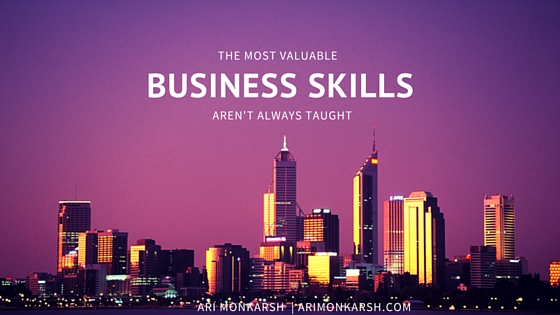
How many hours did you spend in classes during your college career? How many hours on top of that did you spent in the library, hunched over a textbook with a cup of coffee and an energy drink within your grasp, fighting to keep your eyes open as the clock approached 3 am? How many pages upon pages upon pages of notes did you take, scrawling down first everything the professor said, then slowly transitioning to bullet points, then the occasional note in the margin as you struggled to take in everything that was being covered.
And that’s just undergrad–if you’ve got a grad degree you’re playing a whole different ballgame.
Now, how much of those notes do you remember? How many different times were you taught how to write a resume and cover letter, put together a press-release, compiled a business proposal or pitch a marketing idea? Chances are a lot of it was short-term, you kept that knowledge with you during that class or shortly after graduation, when you could apply it at your first job.
Now think back to your first job–what did you learn there? Chances are, that was a lot more valuable. Some of the most valuable skills that will help you in the business world aren’t taught in classrooms.
Work Ethic
I’ve said it before and I won’t hesitate to say it again: you can’t teach hustle. You can’t convince someone to work hard at achieving a goal they don’t want to achieve. Some people are, by nature, lazy. They prefer to have things handed to them rather than earn them. Having a good work ethic is one of the biggest pieces of the employment success puzzle. A lack of experience can be made up for and a lack of knowledge on a specific subject can be learned, but a good work ethic can’t.
Critical Thinking
You know how to write a book report and how to outline a textbook chapter, but can you really break down what was inside that book, and break down, analyze and interpret what was in that chapter? The ability to think critically isn’t something that is taught as much as it’s learned by doing–approaching with the end in mind and strategizing every step of the way. By opening your mind and your way of thinking to the thoughts of others, your critical thinking and problem-solving skills will grow.
Learning from the Past
When you turned in a paper or project in school and got a bad grade, the only thing that you likely learned was not to procrastinate so much the next time around. When the paper was said and done and you received your grade, there was nothing you could do but forget about it and try harder the next time around. With business, “forget about it and try harder” doesn’t work quite as well. A failure in business can be catastrophic, but it can also be a lesson in what to do and what not to do the next opportunity you get. Unlike a paper, however, you can’t just forget about your business and move on–you have to that that failure into account, analyze it, and determine the best cause of action moving forward.
Experience
Experience can’t be taught–it simply isn’t possible. While I’ve spoken before about the fact that experience isn’t the be all end all of business skills, it can’t be ignored, and it certainly can’t be taught. There are certain aspects of a job and certain skills that are necessary to running a business that can only really be ascertained by experiencing them first-hand in a business setting.
